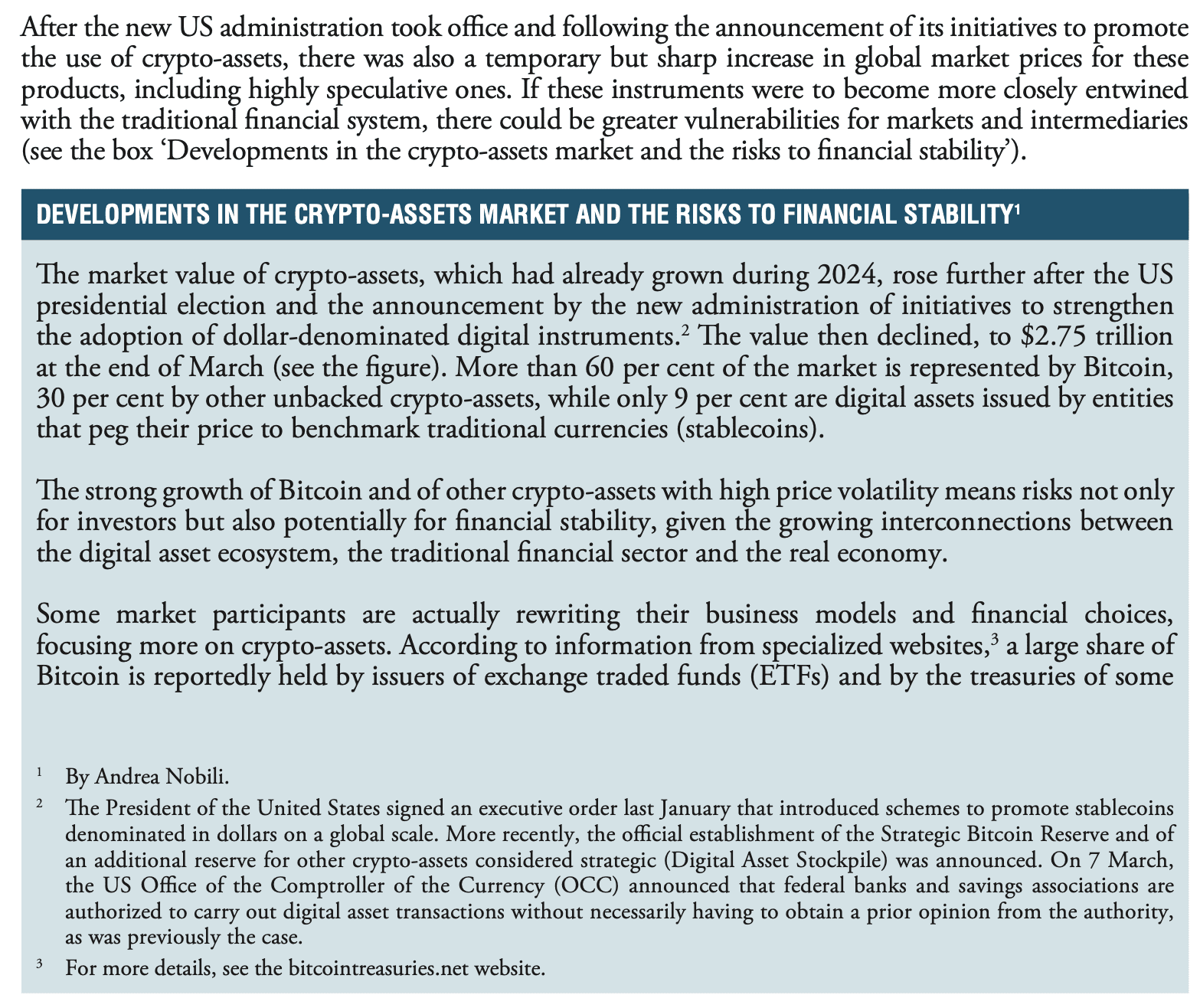The Bank of Italy has issued a warning about the growing risks associated with cryptocurrencies, including Bitcoin (BTC), citing potential dangers for both investors and the overall stability of the financial system. Their April 2025 Financial Stability Report identifies crypto volatility and increasing interconnectedness with the broader economy as key areas of concern.
Here’s a breakdown of the key concerns outlined in the Bank of Italy’s report:
- Investor Risk: The volatile nature of cryptocurrencies like Bitcoin exposes investors to significant potential losses.
- Financial Stability: The increasing integration of crypto assets with traditional financial institutions and the real economy raises concerns about systemic risk.
- Stablecoins: The report highlights potential risks associated with stablecoins, particularly if dollar-pegged tokens become systemic. Increased reliance on US government bonds to back these assets could introduce vulnerabilities.
- Non-Financial Firms’ Crypto Exposure: The trend of non-financial companies holding Bitcoin exposes them to price volatility, potentially impacting their share prices.
“The strong growth of Bitcoin and of other crypto-assets with high price volatility means risks not only for investors but also potentially for financial stability, given the growing interconnections between the digital asset ecosystem, the traditional financial sector and the real economy,” the report states.

The report specifically addresses the trend of non-financial corporations holding Bitcoin. Companies like Strategy (formerly MicroStrategy), Metaplanet, Semler Scientific, and GameStop have adopted this strategy. The Bank of Italy warns that this exposes these companies to significant price swings, driven by the perception that Bitcoin holdings can bolster their stock values.
Furthermore, the Bank of Italy cautions about the potential risks associated with stablecoins, especially if they become systemically important. The report suggests that increased reliance on US government bonds to back these assets could create broader vulnerabilities in the global financial system. Disruptions affecting either stablecoins or the underlying bonds could trigger repercussions across the financial landscape.
Giancarlo Giorgetti, Italy’s Minister of Economy and Finance, has also voiced concerns about the potential threat posed by US dollar stablecoins to the Euro. He emphasized the importance of strengthening the Euro’s global position, noting that the development of a Digital Euro is crucial for reducing reliance on foreign digital solutions.
Why is the Bank of Italy concerned?
The Bank of Italy’s concerns stem from several factors:
- Volatility: Cryptocurrencies are known for their price volatility, which can lead to significant losses for investors, and instability in the market.
- Interconnectedness: As crypto becomes more integrated with the traditional financial system, problems in the crypto market could spread to other sectors, resulting in economic instability.
- Lack of Regulation: The relative lack of regulation in the crypto space makes it difficult to protect investors and prevent fraud.
- Potential for Illicit Activity: Cryptocurrencies can be used for illicit activities, such as money laundering and terrorism financing.
What are the potential implications?
If the Bank of Italy’s concerns are realized, the implications could be serious:
- Investor Losses: Investors could lose a significant amount of money if the crypto market crashes.
- Financial Instability: The financial system could become unstable if crypto assets are interconnected with traditional financial institutions.
- Economic Recession: A crypto-related financial crisis could trigger an economic recession.
What are possible solutions?
To mitigate these risks, several measures can be taken:
- Regulation: Implementing clear and comprehensive regulations for the crypto market is essential to protect investors and prevent fraud.
- Oversight: Increased oversight of crypto firms and their activities is necessary to ensure compliance with regulations.
- Education: Educating investors about the risks of crypto investing is crucial to help them make informed decisions.
- Innovation: Support for innovative solutions like the Digital Euro can promote competition and reduce reliance on foreign currencies and systems.
In conclusion, the Bank of Italy’s warning underscores the need for vigilance and proactive measures to address the risks associated with the growing cryptocurrency market. A balanced approach that fosters innovation while safeguarding investors and ensuring financial stability is essential.